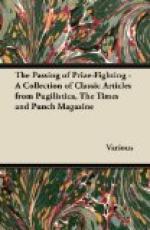=Before the cenotaph.=
November 11th, 1920.
Not with dark pomp of death we keep their
day,
Theirs who have passed beyond
the sight of men,
O’er whom the autumn
strews its gold again,
And the grey sky bends to an earth as
grey;
But we who live are silent even as they
While the world’s heart
marks one deep throb; and then,
Touched by the gleam of suns
beyond our ken,
The Stone of Honour crowns the trodden
way.
Above the people whom they died to save
Their shrine of sleep is set;
abideth there
No dust corruptible, nought that death
may have;
But from remembrance of the
days that were
Rises proud sorrow in a resistless wave
That breaks upon the empty
sepulchre.
D. M. S.
* * * * *
=Our Invincible Navy.=
Prize-money.
The really intriguing thing about Naval prize-money is the fact that no one knows exactly where it comes from. You don’t win it by any definite act of superlative daring—I mean to say, you don’t have to creep out under cover of darkness and return in the morning with an enemy battleship in tow to qualify for a modicum of this mysterious treasure. You just proceed serenely on your lawful occasions, confident in the knowledge that incredible sums of prize-money are piling themselves up for your ultimate benefit. I suppose the authorities understand all about it; nobody else does. One just lets it pile. It is a most gratifying thought.
During the more or less stormy times of the First Great War, we of the Navy were always able to buttress our resolution with golden hopes of a future opulence denied to our less fortunate comrades in the trenches. Whenever the struggle was going particularly badly for us—when, for instance, a well-earned shore-leave had been unexpectedly jammed or a tin of condensed milk had overturned into somebody’s sea-boot—we used to console each other with cheerful reminders of this accumulating fruit of our endeavours. “Think of the prize-money, my boy,” we used to exclaim; “meditate upon the jingling millions that will be yours when the dreary vigil is ended;” and as by magic the unseemly mutterings of wrath would give place to purrs of pleasurable anticipation. Even we of the R.N.V.R., mere temporary face-fringes, as it were, which the razor of peace was soon to remove from the war-time visage of the Service—even we fell under the spell. “Fourteen million pounds!” we would gurgle, hugging ourselves with joy in the darkness of the night-watches.
In the months immediately following demobilisation I was frequently stimulated by glittering visions of vast wealth presently to be showered upon me from the swelling coffers of a grateful Admiralty. During periods of more or less temporary financial embarrassment I would mention these expectations to my tailor and other restless tradespeople of my acquaintance. “Fourteen millions—prize-money, you know,” I would say confidentially; “may come in at any time now.” I found this had a soothing effect upon them.




